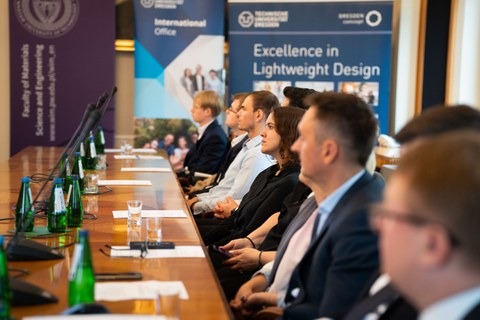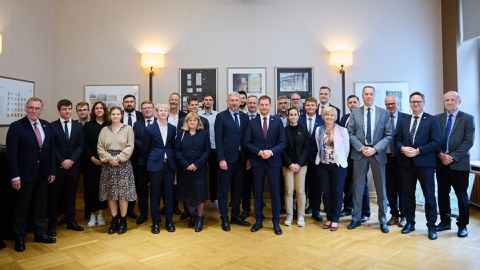Oct 05, 2024
Cooperation event at the Rectorate of the TU Warsaw on October 3, 2024
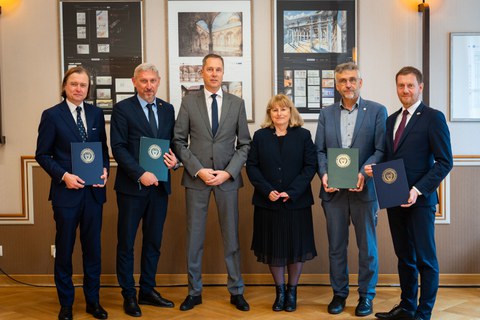
Group photo (from left to right): Mariusz Frankowski, Prof. Mariusz Malinowski, Prof. Dr. Maik Gude, Prof. Anna Boczkowska, Prof. Dr. Michael Kobel and Michael Kretschmer.
On the Day of German Unity, a cooperation event was held at the Rectorate of the Warsaw University of Technology (Politechnika Warszawska) to further expand the 30-year scientific partnership between the TU Warsaw and TU Dresden. In the presence of the Prime Minister of Saxony, Michael Kretschmer, and the Voivode of Mazovia, Mariusz Frankowski, Prof. Mariusz Malinowski, Vice-Rector Research at TU Warsaw, and Prof. Michael Kobel, Vice-Rector Academic Affairs at TU Dresden, signed the new editions of the Memorandum of Understanding and the Cotutelle Framework Agreement between the two universities. The cooperation event was attended by academics and students from the Universities of Technology in Warsaw, Dresden, Białestok and Silesia, as well as a delegation from the Saxon State Chancellery.
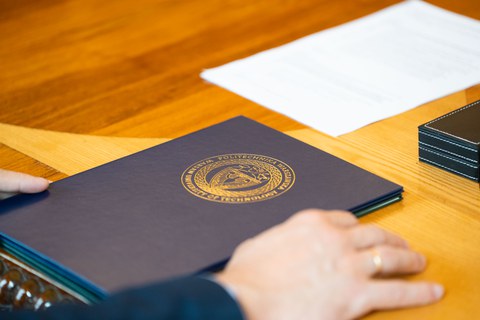
Signing of the Memorandum of Understanding.
The long-standing partnership between TU Dresden and TU Warsaw promotes international exchange through joint projects in teaching, research and science communication. In the area of teaching, the focus is on a cotutelle doctoral program developed and run by the Institute of Lightweight Engineering and Polymer Technology (ILK) at TU Dresden, the exchange of students and the International Masterclass initiated by TU Dresden as part of the International Particle Physics Outreach Group (IPPOG, https://ippog.org/). The doctoral program was launched by Prof. Anna Boczkowska, Dean of the Faculty of Materials Engineering at TU Warsaw and Prof. Maik Gude, Director of the Institute of Lightweight Engineering and Polymer Technology (ILK) at TU Dresden. Together with other professors, they supervise the students in their research work.
Through joint research projects based on excellent basic research, practical results are achieved that are transferred to small and medium-sized enterprises (SMEs) in particular, thus making a significant contribution to increasing their competitiveness.
Minister President Michael Kretschmer highlighted the importance of this partnership and emphasized that: "great science is created through internationality, excellence & interdisciplinarity – this is what connects TU Warsaw and TU Dresden. The signing of the Memorandum of Understanding and the Cotutelle Framework Agreement consolidates this cooperation. Our aim is to make our joint scientific and economic area even stronger. This is the only way we can tackle the major global challenges."
In a pitch session and in conversation with the Minister President, doctoral students and Master's students were given the opportunity to report on their research and the importance of cross-border education for their own personal development. Both Prime Minister Kretschmer and representatives of TU Warsaw and TU Dresden emphasized the importance of training future-oriented engineers to maintain competitiveness. It is necessary to address pupils at an early stage and in an appropriate manner in order to arouse and promote their interest in STEM subjects. A new Interreg project "Interreg project: X-Garden, Transgraniczne Ogrody Doświadczeń/Cross-border Experimental Gardens", which will start at the beginning of 2025 and establish long-term strategic cooperation between schools and research institutions in Poland and Germany, will serve this purpose. STEM education at universities aims to provide students with an excellent education, raise awareness of the importance of global sustainability goals and impart a high level of competitiveness. The aim is to convey the image of modern engineers who are characterized by self-confidence, pride and confidence.
The partnership between TU Warsaw and TU Dresden, which follows the hub principle, also enables networking with other research and industry partners. The relationship with Białystok University of Technology is particularly important, as it acts as an interface to the Baltic States. By bringing together partners from Saxony, Poland and the Baltic States, a new strategic alliance is currently emerging that stretches from Dresden to Tallinn.
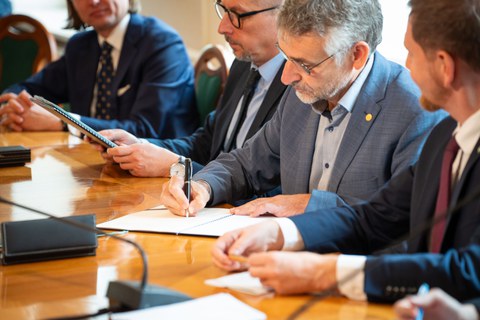
Vertragsunterzeichnung des Memorandum of Understanding.
In his welcoming address, Prof. Kobel pointed out that "the new alliance with the Baltic States will make a significant contribution to the broader European research ecosystem. It would be a serious omission to miss the opportunity to meaningfully integrate Central and Eastern European stakeholders into the European research market. Given the still limited network in Central and Eastern Europe, it is crucial to connect it with other important EU centers relevant to European research programs. Warsaw as a cosmopolitan city is central to this vision and WUT and its partners have demonstrated their ability to play a crucial role in this."
The GreenCompas project "Green materials and energy-efficient processes for circular composite products by utilizing regional potentials and pan-European partnerships", initiated by the Institute of Lightweight Engineering and Polymer Technology (ILK) at TU Dresden and presented at the cooperation event, follows this objective. The project pools the expertise of relevant stakeholders from Saxony, Poland and the Baltic States as well as other interest groups from Greece and Romania in order to initiate high-impact research projects at European level. These research projects will focus on recyclable high-performance materials based on biogenic raw materials, an important topic for a sustainable economy.

